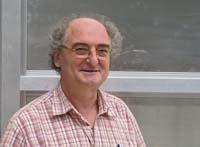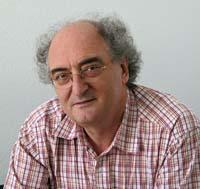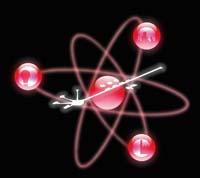Scientist CSIC and UPV
Javier Bermejo: "It is not viable to propel a ton and a half car to transport a person of 70 kilos"
01/09/2008 | Urruzola Arrate, Manex | Elhuyar Zientzia Komunikazioa

(Photo: M. M. Urruzola)
For the past five years he has worked on research on hydrogen storage for cars. How does that line of research go?
The aim is to use hydrogen as a fuel and a car has a range of 500 km. The results of the research reached half of this goal last year. This year we have reached 75% of the objective and we have also achieved that the conclusions are completely reversible. This has been done with the structure of carbon nanoramas, with the aim of obtaining a material that absorbs six kilos of hydrogen, reaching the hydrogen to 6% of the group of materials. The results are very positive.
We have another line of research with nanobirates or nanopergaminos. Computer calculations and simulations indicate that it will be spectacular, that a lot of hydrogen can be stored. We have already prepared some samples for testing. It will have to be seen.
Last year they published an article with the main conclusions about nanoramas in the prestigious journal Physical Review Letters. They also managed to advance to the scientists of the U.S. Department of Energy...
With the new results we have now, the measurements are made and look very good. Before publishing these new results we have to characterize the samples --make a micrograph and a chemical characterization-, but I do not think that in a few months we can have problems to carry them out and make a new edition.
Precisely, storage difficulty is one of the main drawbacks of hydrogen today to become a real energy alternative. In the near future will this difficulty be overcome in an effective way?
We must take into account the efforts being made. Many groups are working on different research lines. I believe that batteries will soon be achieved that meet the minimum objectives, for example 500 kilometers of autonomy. But another thing is to try to replace most of the oil with hydrogen.

(Photo: M. M. Urruzola)
Will hydrogen compete energetically and economically with oil in the coming decades before the energy crisis takes dramatic indications?
I do not think the crisis is energy, but economic. I see it difficult to build as many hydrogen plants as are necessary to maintain the automotive parks anywhere in the world. What is discussed is not whether the car should be put gasoline or hydrogen, but the model of civilization itself. This is not sustainable. If to transport a person of 70 kilos you have to propel a car of ton and a half, then, hey, the energy balance is not viable... This worked well when only a few privileged used the car, but now...
In recent years numerous prototypes of hydrogen cars have been presented to the press, the last few weeks the hydrogen cars of Renault and Tecnalia. What is missing to get the serial manufacturing of these cars?
The fundamental problem is the accumulation of hydrogen. After deposit, combustion is simple: it is only a mixture of hydrogen and air. When the storage of hydrogen is safely solved, an infrastructure of hydrogen refueling stations will be needed to load the hydrogen gas. And that's not unthinkable: a hydrogen niche will not be much more dangerous than a gas station, where there are thousands of liters of flammable products underground. I think hydrogen is an alternative to some extent, but we have to adapt it to measures to change habits that do not have to be a disaster. In London, for example, traffic was fixed when they started charging to access the city centre. In Japan few people use the particular car to travel.
And in Denmark they raise taxes to owners of vehicles...
They are decisions contrary to the majority will, but we do not have much room for manoeuvre. Neither hydrogen, nor oil, nor biofuels: no one will solve the problem. There is no oil, or better said, we do not know how much there is, because all reservation statements are false because they are all political. We know it is a scarce good, but no one knows how much oil there is. What we know is that the increase in oil began after the war in Iraq. The problem is that there is too much speculation. One thing is the economic crisis, the geopolitical situation or the invasion of a country, and another thing is the natural resource. Oil can be exhausted, of course, but can be exhausted like five years ago, and the price difference is huge: more than double.
Another major problem of hydrogen is the difficulty to achieve it. In school we have been taught to all that hydrogen is obtained from the electrolysis of water. Hydrogen gurus, like Rifkin, also mention electrolysis as a way to get hydrogen.

"The industrial production of hydrogen is not a disparate and, given the price it is receiving, it can be a fuel that competes significantly with it."
P. P. Rotkiewicz
My recommendation is to consult Wikipedia, a resource so hidden and exclusive.
In a glass is placed water and a pile, obtaining separately oxygen and hydrogen. That is so, of course, it works and is known many years ago. But it is impossible from an industrial point of view. The energy balance of electrolysis is extremely low: the need to use a lot of electrical energy to obtain a little hydrogen makes it economically unviable.
There are industrially more reasonable pathways, such as methane and high-temperature water reaction, which can produce hydrogen in industrial quantities at a reasonable price. This also has the disadvantage of generating a little carbon monoxide that will then have to be processed, but that is the way to take economically.
However, today it is clear that the industrial production of hydrogen is not a disparate and, given the price that oil is receiving, can be a fuel that competes with it significantly.
"ESS-Bilbao would have many possibilities to judge only the technical capacity of the candidatures. But I don't think it's like that"
You are also the coordinator of the scientific and technical committee of the Bilbao candidacy of the European Space Source (ESS). How is the process going?
I think there has been a lack of important criterion. The policy governs the structure of the candidacy ESS-Bilbao and the capacity of decision is of that level. We have had to go against the wind in the last two years, because there are still those who think that there is nothing technical that should be installed, and today there are those who think that ESS-Bilbao does not need a stable structure.
In any case, I think the technical proposal of the candidacy is good and has had a good reception in the European Congress of Particle Accelerators. In addition, we have contacted the most important laboratories in Europe to propose certain collaborations, with a positive result.
ESS-Bilbao would have many options if only the technical capacity of the candidates was judged. But I don't think it's like that.
What will be the characteristics of ESS-Bilbao? What will it serve for?
It is a very powerful center for basic and viable research that will provide service to numerous research centers at international level. The properties of materials and biomoleculae, among others, will be studied.
What advantages does the success of the candidacy bring to Bizkaia and the Basque Country in general?

The ESS Center will create neutrons that penetrate the materials to provide detailed information on the atomic structure. Neutron spalation, used by researchers of materials and biomolecules, has multiple applications in medicine, automotive and electronics, among others.
(Photo f-3.net)
Elaboration. If an industrial base were created, the advantages would be enormous. And that is not propaganda: the reference center for that calculation is that of Grenoble, with a reactor and a synchrotron. This is a black hole, that is, more than 90% of contracts with Grenoble remain around in the regional workshops. But that's because they've been charged with running that way. The Basque Country is an ideal environment to do something like this, since its technological potential coincides fully with this project.
The competition also strives with desire: Sweden has a strong university and technological structure that matches the economic proposal of the Basques...
Sweden does one thing very well: propaganda. It is true that it has a very powerful technological structure, with a synchrotron in the university. But one thing is that reality, very effective from the propaganda point of view, and another is the content of the Swedish project, which does not bring anything new from the concepts of demand of the year 2000. In addition, the location of the candidacy is of very low quality from a geological point of view. But they have been selling well for many years.
When will the final decision be known? What options does the candidacy of Bilbao really have?
Given that the money does not come from the European Union, but from bilateral participation agreements, the money will be provided by the countries that join the consortium of the candidacy. That is, Europe has no decision-making capacity in this. It will really win the candidacy that gets more support. At the moment, with the UK and France, things are not bad, although they do not offer clear protection. We have also contacted Italy, with clear possibilities of collaboration. We have also contacted the Russians of Saint Petersburg and Moscow. That is, taking into account the available structure, I do not think that things have been done wrong. But what is clear is that if no decision is made within a year, this will be completely emptied.
What kind of decision should we make?
This candidacy started with a clear advantage: More than 300 million were put on the table. But this advantage was squandered by the failure to demonstrate the technological capacity and seriousness of the candidacy. If you want to show seriousness, you have to start doing something. We are preparing a very limited base with the ion source that we are organizing in the faculty. But the situation is critical: if a change of strategy is not made in time, there will be no option here. And with its density, the technological base of the Basque Country cannot be neglected like this.
Urruzola Arrate, Manex
Services Services Services
245 245
2008 2008 2008 2008 2008
Information about information
027 027 027
Conversations Conversations Conversations Conversations
Interview with Laura Holgado Interview of Interview
Services Services Services












